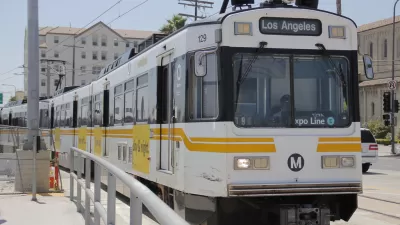UCLA's Paul Habibi believes that L.A.'s lack of affordable workforce housing, the "donut hole" between subsidized housing and high-end housing preferred by developers, is harming the city's competitiveness. In a new report he outlines a solution.
Produced in conjunction with the Los Angelss Business Council, Habibi's report [PDF], titled "Developing Livable Communities: Enhancing Economic Competitiveness in Los Angeles," concludes that the solution to filling the donut hole is to, "[c]reate an incentive to develop housing for this group along transit
corridors, which are currently being expanded in L.A.," writes Matthew DeBord.
"Continued
investment in transit and transit corridors will make LA more
economically competitive," said Habibi, who was the report's lead
author.
"If you think this is about creating more density in infamous L.A.
urban sprawl, you'd be right on track," says DeBord. "'You want to bring the workforce
back toward the employment centers,' Habibi said. 'We need to lower the
economic cost of getting workers from point A to point B.'"
Habibi, who just happens to own over 1,600 apartment units in the Los Angeles area, says that incentives must focus on lowering risks and costs for developers, with easing environmental reviews identified as one potentially effective policy change.
FULL STORY: Workforce housing in LA costs too much. Here's how to fix it

Alabama: Trump Terminates Settlements for Black Communities Harmed By Raw Sewage
Trump deemed the landmark civil rights agreement “illegal DEI and environmental justice policy.”

Study: Maui’s Plan to Convert Vacation Rentals to Long-Term Housing Could Cause Nearly $1 Billion Economic Loss
The plan would reduce visitor accommodation by 25% resulting in 1,900 jobs lost.

Planetizen Federal Action Tracker
A weekly monitor of how Trump’s orders and actions are impacting planners and planning in America.

Wind Energy on the Rise Despite Federal Policy Reversal
The Trump administration is revoking federal support for renewable energy, but demand for new projects continues unabated.

Passengers Flock to Caltrain After Electrification
The new electric trains are running faster and more reliably, leading to strong ridership growth on the Bay Area rail system.

Texas Churches Rally Behind ‘Yes in God’s Back Yard’ Legislation
Religious leaders want the state to reduce zoning regulations to streamline leasing church-owned land to housing developers.
Urban Design for Planners 1: Software Tools
This six-course series explores essential urban design concepts using open source software and equips planners with the tools they need to participate fully in the urban design process.
Planning for Universal Design
Learn the tools for implementing Universal Design in planning regulations.
Caltrans
Smith Gee Studio
Institute for Housing and Urban Development Studies (IHS)
City of Grandview
Harvard GSD Executive Education
Toledo-Lucas County Plan Commissions
Salt Lake City
NYU Wagner Graduate School of Public Service




























